小升初英语八大时态精讲精练课件 26张PPT
文档属性
| 名称 | 小升初英语八大时态精讲精练课件 26张PPT |  | |
| 格式 | zip | ||
| 文件大小 | 223.1KB | ||
| 资源类型 | 教案 | ||
| 版本资源 | 人教版(PEP) | ||
| 科目 | 英语 | ||
| 更新时间 | 2018-11-28 10:52:25 | ||
图片预览

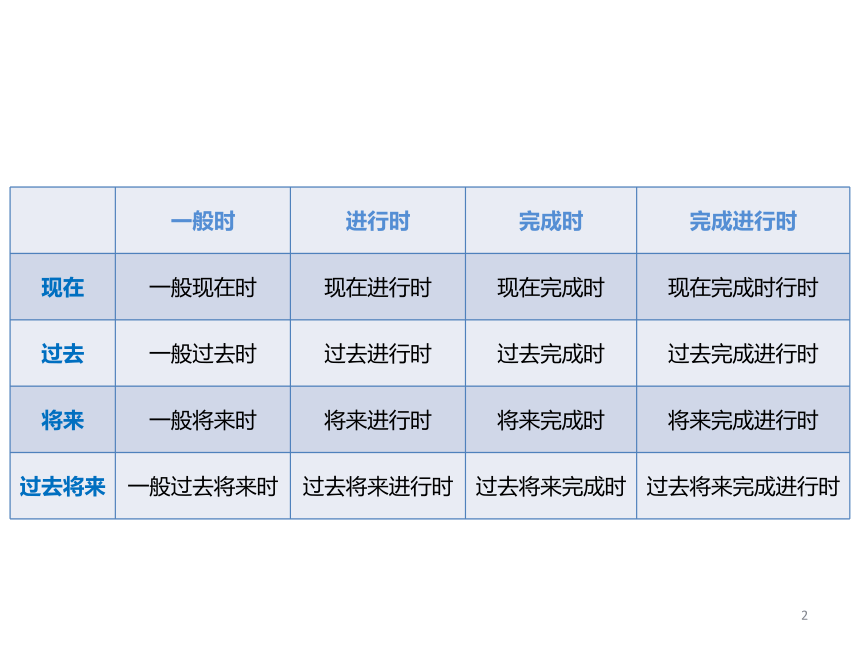
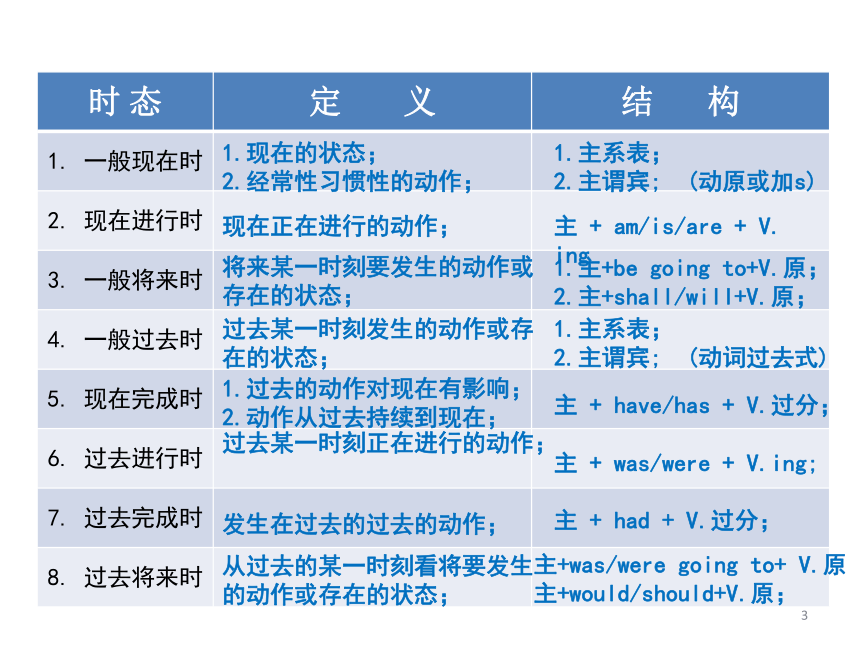
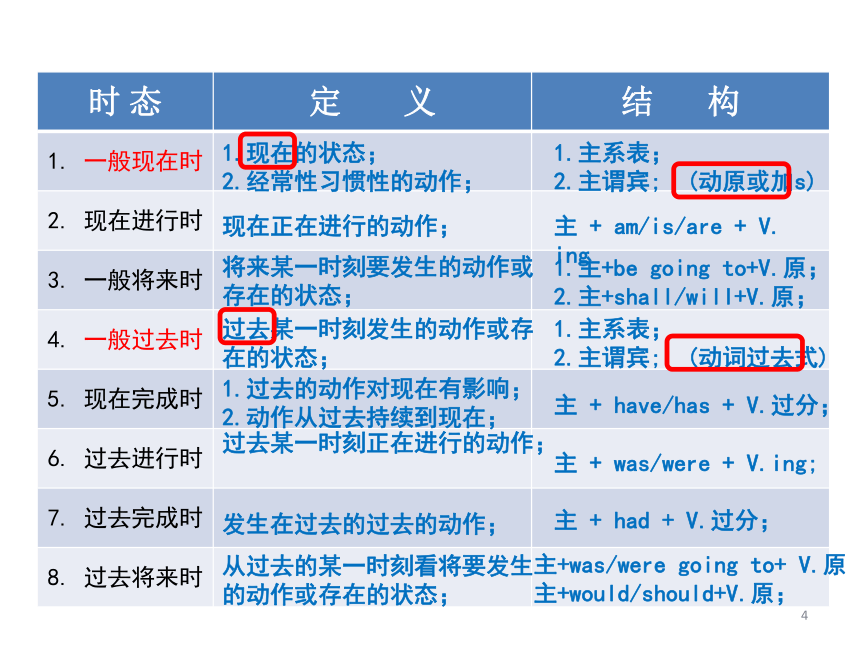
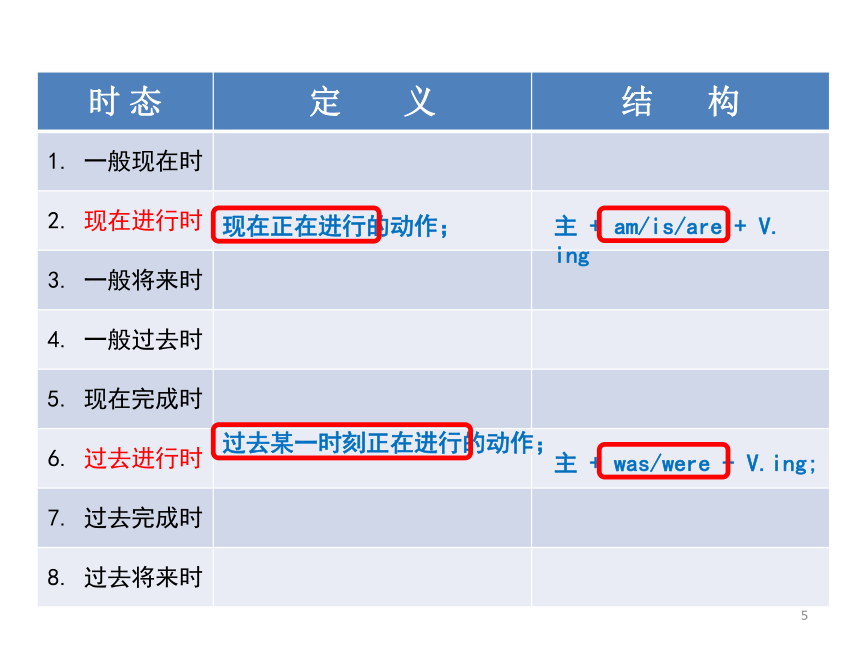
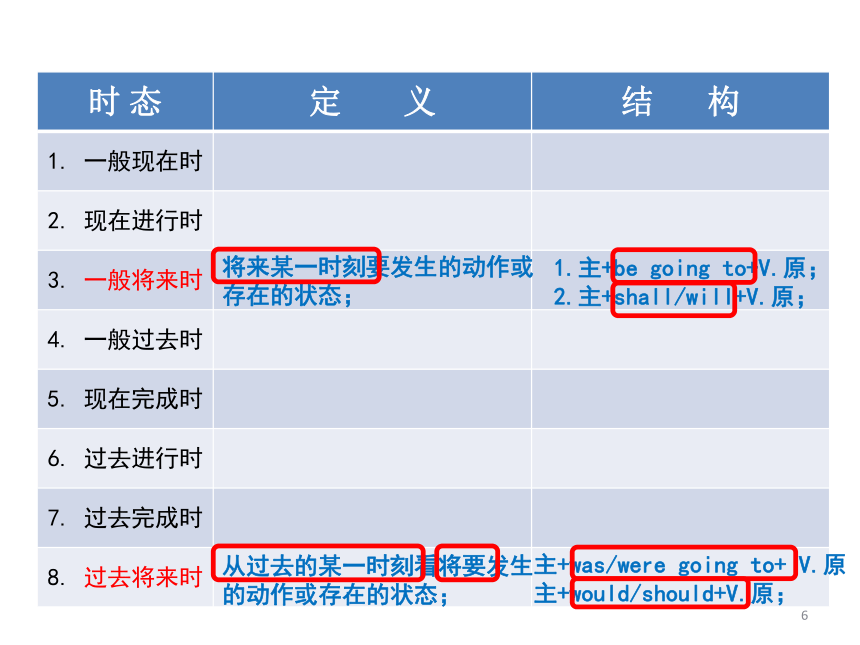
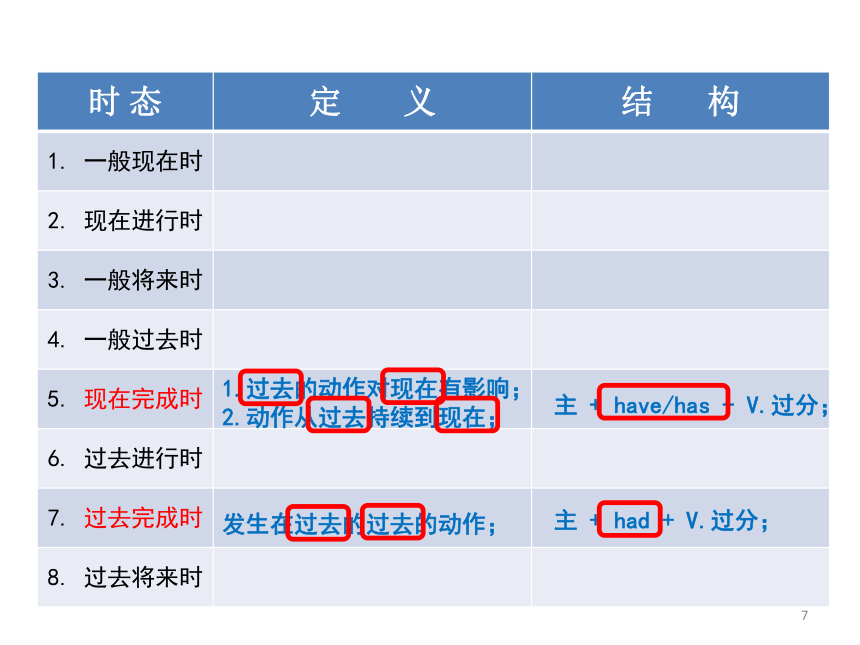

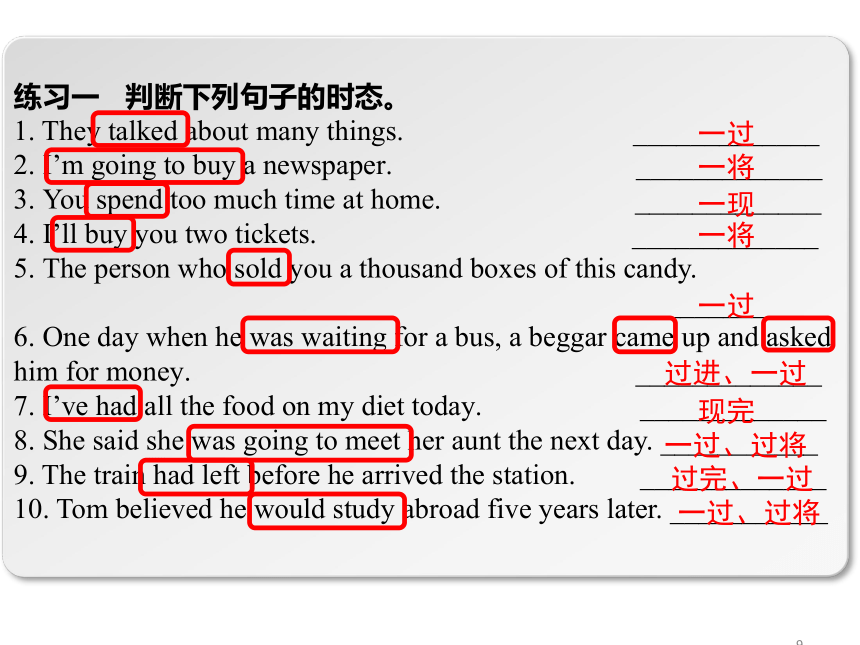
文档简介
1
时态复习
2
一般时 进行时 完成时 完成进行时
现在 一般现在时 现在进行时 现在完成时 现在完成时行时
过去 一般过去时 过去进行时 过去完成时 过去完成进行时
将来 一般将来时 将来进行时 将来完成时 将来完成进行时
过去将来 一般过去将来时 过去将来进行时 过去将来完成时 过去将来完成进行时
时 态 定 义 结 构
1. 一般现在时
2. 现在进行时
3. 一般将来时
4. 一般过去时
5. 现在完成时
6. 过去进行时
7. 过去完成时
8. 过去将来时
1.现在的状态;
2.经常性习惯性的动作;
1.主系表;
2.主谓宾; (动原或加s)
现在正在进行的动作;
主 + am/is/are + V. ing
将来某一时刻要发生的动作或存在的状态;
1.主+be going to+V.原;
2.主+shall/will+V.原;
过去某一时刻发生的动作或存在的状态;
1.主系表;
2.主谓宾; (动词过去式)
1.过去的动作对现在有影响;
2.动作从过去持续到现在;
主 + have/has + V.过分;
过去某一时刻正在进行的动作;
主 + was/were + V.ing;
发生在过去的过去的动作;
主 + had + V.过分;
从过去的某一时刻看将要发生的动作或存在的状态;
主+was/were going to+ V.原
主+would/should+V.原;
3
时 态 定 义 结 构
1. 一般现在时
2. 现在进行时
3. 一般将来时
4. 一般过去时
5. 现在完成时
6. 过去进行时
7. 过去完成时
8. 过去将来时
1.现在的状态;
2.经常性习惯性的动作;
1.主系表;
2.主谓宾; (动原或加s)
现在正在进行的动作;
主 + am/is/are + V. ing
将来某一时刻要发生的动作或存在的状态;
1.主+be going to+V.原;
2.主+shall/will+V.原;
过去某一时刻发生的动作或存在的状态;
1.主系表;
2.主谓宾; (动词过去式)
1.过去的动作对现在有影响;
2.动作从过去持续到现在;
主 + have/has + V.过分;
过去某一时刻正在进行的动作;
主 + was/were + V.ing;
发生在过去的过去的动作;
主 + had + V.过分;
从过去的某一时刻看将要发生的动作或存在的状态;
主+was/were going to+ V.原
主+would/should+V.原;
4
时 态 定 义 结 构
1. 一般现在时
2. 现在进行时
3. 一般将来时
4. 一般过去时
5. 现在完成时
6. 过去进行时
7. 过去完成时
8. 过去将来时
现在正在进行的动作;
主 + am/is/are + V. ing
过去某一时刻正在进行的动作;
主 + was/were + V.ing;
5
时 态 定 义 结 构
1. 一般现在时
2. 现在进行时
3. 一般将来时
4. 一般过去时
5. 现在完成时
6. 过去进行时
7. 过去完成时
8. 过去将来时
将来某一时刻要发生的动作或存在的状态;
1.主+be going to+V.原;
2.主+shall/will+V.原;
从过去的某一时刻看将要发生的动作或存在的状态;
主+was/were going to+ V.原
主+would/should+V.原;
6
时 态 定 义 结 构
1. 一般现在时
2. 现在进行时
3. 一般将来时
4. 一般过去时
5. 现在完成时
6. 过去进行时
7. 过去完成时
8. 过去将来时
1.过去的动作对现在有影响;
2.动作从过去持续到现在;
主 + have/has + V.过分;
发生在过去的过去的动作;
主 + had + V.过分;
7
时 态 结 构 动词形式
1. 一般现在时
2. 现在进行时
3. 一般将来时
4. 一般过去时
5. 现在完成时
6. 过去进行时
7. 过去完成时
8. 过去将来时
动原或加s
am/is/are + V. ing
1.be going to+V.原;
2.shall/will+V.原;
V.过去式
have/has + V.过分;
was/were + V.ing;
had + V.过分;
was/were going to+ V.原would/should+V.原;
8
1.主系表;
2.主谓宾; (动原或加s)
主 + am/is/are + V. ing
1.主+be going to+V.原;
2.主+shall/will+V.原;
1.主系表;
2.主谓宾; (动词过去式)
主 + have/has + V.过分;
主 + was/were + V.ing;
主 + had + V.过分;
主+was/were going to+ V.原
主+would/should+V.原;
9
练习一 判断下列句子的时态。
1. They talked about many things. _____________
2. I’m going to buy a newspaper. _____________
3. You spend too much time at home. _____________
4. I’ll buy you two tickets. _____________
5. The person who sold you a thousand boxes of this candy.
_____________
6. One day when he was waiting for a bus, a beggar came up and asked him for money. _____________
7. I’ve had all the food on my diet today. _____________
8. She said she was going to meet her aunt the next day. ___________
9. The train had left before he arrived the station. _____________
10. Tom believed he would study abroad five years later. ___________
一过
一将
一现
一将
一过
过进、一过
现完
一过、过将
过完、一过
一过、过将
时 态 时 标
1. 一般现在时
2. 现在进行时
3. 一般将来时
4. 一般过去时
5. 现在完成时
6. 过去进行时
7. 过去完成时
8. 过去将来时
10
1.every系列;2.频率副词;3.客观事实;4.频率短语;5.on+星期s。
look, listen, now = at the moment = at present; 简短祈使句;
1.tomorrow系列;2.next系列;3.in + 一段时间;4.soon, in future, in the future; 5. this系列;
1.yesterday系列;2.ago系列;3.last系列;4.in + 过去时间;5.just now;
不与过去的时间点连用,already, ever, never, yet, just, still, since, for, by, before, so far, in the past/last + 时间段;
at + 点钟 + 过去时间;2.at that moment; 3.when, while, as引导的时间状语从句;
两个动作发生在过去,先过完,后一过;
the following/next day; the next year/week/month;
主句为过去时,从句表示将要发生的动作的宾从中。
11
练习二 用所给动词的正确形式填空。
1. He often???????? (have) dinner at home.
2.. The girl ????? ? (teach) us English on Sundays.
3. Sally _________ (be) here just now.
4. He _____________ (arrive) in three days.
5. ________ you ________ (be) free next Sunday?
6. Tom and Mary ___________ (come) to China last month.
7. Tom ___________ (begin) to learn Chinese last year.
8. Our P.E. teacher _____________ (be) in the Party for ten years.
9. Don’t make so much noise. The baby ____________(sleep).
10. My father __________ (go) to Paris already and he will be back in half a year.
11. Mr. Smith said that he __________(visit) our school the next week.
12. When I got to the station, the train ______________(leave). So I had to wait for the next one.
口诀:依时定态,依态定形。
has
teaches
was
will arrive
Will be
came
began
has been
is sleeping
has gone
would visit
had left
12
变否变疑练习
1. I am hungry.
否:
疑:
回答:
2. I can move it.
否:
疑:
回答:
3. I like this movie.
否:
疑:
回答:
变否:找到be助情,后面加not.
变疑:找到be助情,大写提句首,
第一人称作变化,句号变问号。
综合:有be有情直接用,无be无情必加助。
I am not hungry.
Are you hungry?
Yes, I am. / No, I am not.
I can’t move it.
Can you move it?
Yes, I can. / No, I can’t.
I don’t like this movie.
Do you like this movie?
Yes, I do. / No, I don’t.
第一人称:I ,we;
be动词:am, is, are, was, were;
情态动词:can, must, could, may, might, should;
助动词:do, does, did, will, shall,be going to, have, has,
had, would;
注意:
1.情态动词后面跟动原;
2.助动词do, does, did, will, shall, be going to, would后面跟动原;have, has, had后面跟动词的过去分词;
14
练习三 变否变疑
1. He wants a new phone.
2. They were happy last night.
3. I was at home last Sunday.
4. I met a foreigner yesterday morning.
5. He is going to go to Hongkong next year.
6. We shall swim in the river tomorrow afternoon.
7. My father is reading an interesting book now.
8. I have been there.
9. Lu Ming has just joined the army.
15
He had lunch at home yesterday.
主语
谓语
宾语
地状
时状
一、对主语提问
Who had lunch at home yesterday?
He had lunch at home yesterday.
宾语
二、对宾语提问
what
1. 定特词
2.变一疑
Did he have lunch at home yesterday?
3.去划线
What did he have lunch at home yesterday?
He had lunch at home yesterday.
地状
三、对地状提问
where
1. 定特词
2.变一疑
Did he have lunch at home yesterday?
3.去划线
Where did he have lunch at home yesterday?
He had lunch at home yesterday.
时状
四、对时状提问
when
1. 定特词
2.变一疑
Did he have lunch at home yesterday?
3.去划线
When did he have lunch at home yesterday ?
He had lunch at home yesterday.
谓 宾
五、对谓宾提问
what
1. 定特词
2.变一疑
Did he have lunch at home yesterday?
3.去划线
What did he have lunch at home yesterday?
4.加实义动词do
What did he at home yesterday?
do
一、对划线部分提问。
1. Daniel watches TV every evening.
?
2. She likes milk.
?
3. We go to school every morning.
?
4. He speaks English every day.
?
5. John comes from Canada.
?
6. She is a good student.
?
7. Simon and Daniel like going skating.
What does Daniel watch every evening?
What does she like?
Who goes to school every morning?
What does he do every day?
Where does John come from?
What is she?
Who likes going skating?
8. We have many friends in China.
?
9. They can stay at home for two days.
?
10. I want to sleep a little longer because I’m tired.
?
11. They have nice kites.
?
12. My brother plays football once a week.
?
13. My parents watch TV every evening.
?
14. Jim goes to school every day on foot.
?
?
Where do you have many friends?
How long can they stay at home?
Why do you want to sleep a little longer?
Who has nice kites?
How often does your brother play football?
What do your parents do every evening?
How does Jim go to school every day?
15. They are looking for bag.
?
16. I am riding my bike now.
?
17. She is buying some food in the supermarket.
?
18. They are watching TV now.
?
19. Tom is reading books in the study.
?
20. She will type the letter tomorrow.
?
21. Marry will see her aunt next week.
?
What are they looking for?
What are you doing now?
Where is she buying some food?
What are they watching now?
What is Tom doing in the study?
What will she type tomorrow?
When will Marry see her aunt?
22. Mrs. Sterling will have a picnic in the forest next month.
?
23. My father will repair the TV soon.
?
24. We shall see a new movie tonight.
?
25. I am going to buy a comic book next week.
?
26. They are going to swim in the river.
?
27. Lucy is going to try the dress.
?
28. My parents are going to visit the Great Wall next year.
?
Where will Mrs. Sterling have a picnic next month?
Who will repair the TV soon?
What will you do tonight?
Who is going to buy a comic book next week?
Where are they going to swim?
What is Lucy going to try?
What are your parents going to do next year?
29. I’ll be back in a few minutes.
?
30. She was in the kitchen .
?
31. I visited a friend.
?
32. We went to school last week.
?
33. Tom read a book last night.
?
34. I came here five years ago.
?
35. Mr. Wang went to America by plane.
How soon will you be back?
Where was she?
Who did you visit?
When did you go to school?
What did Tom do last night?
When did you come here?
How did Mr. Wang go to America?
36. They moved to France because their father found a job there.
?
37. I have cleaned the floor.
?
38. Sam has just bought a phone in the shop.
?
39. They have eaten some bread.
?
40. I have already borrowed an umbrella for you.
?
41. His father has been dead for two years.
?
42. The workers have finished the building.
?
43. Steve has just got a new job.
?
Why did they move to France?
What have you cleaned?
Where has Sam just bought a phone?
Who has eaten some bread?
What have you done for me yet?
How long has his father been dead?
What have the workers done?
What has Steve just got?
时态复习
2
一般时 进行时 完成时 完成进行时
现在 一般现在时 现在进行时 现在完成时 现在完成时行时
过去 一般过去时 过去进行时 过去完成时 过去完成进行时
将来 一般将来时 将来进行时 将来完成时 将来完成进行时
过去将来 一般过去将来时 过去将来进行时 过去将来完成时 过去将来完成进行时
时 态 定 义 结 构
1. 一般现在时
2. 现在进行时
3. 一般将来时
4. 一般过去时
5. 现在完成时
6. 过去进行时
7. 过去完成时
8. 过去将来时
1.现在的状态;
2.经常性习惯性的动作;
1.主系表;
2.主谓宾; (动原或加s)
现在正在进行的动作;
主 + am/is/are + V. ing
将来某一时刻要发生的动作或存在的状态;
1.主+be going to+V.原;
2.主+shall/will+V.原;
过去某一时刻发生的动作或存在的状态;
1.主系表;
2.主谓宾; (动词过去式)
1.过去的动作对现在有影响;
2.动作从过去持续到现在;
主 + have/has + V.过分;
过去某一时刻正在进行的动作;
主 + was/were + V.ing;
发生在过去的过去的动作;
主 + had + V.过分;
从过去的某一时刻看将要发生的动作或存在的状态;
主+was/were going to+ V.原
主+would/should+V.原;
3
时 态 定 义 结 构
1. 一般现在时
2. 现在进行时
3. 一般将来时
4. 一般过去时
5. 现在完成时
6. 过去进行时
7. 过去完成时
8. 过去将来时
1.现在的状态;
2.经常性习惯性的动作;
1.主系表;
2.主谓宾; (动原或加s)
现在正在进行的动作;
主 + am/is/are + V. ing
将来某一时刻要发生的动作或存在的状态;
1.主+be going to+V.原;
2.主+shall/will+V.原;
过去某一时刻发生的动作或存在的状态;
1.主系表;
2.主谓宾; (动词过去式)
1.过去的动作对现在有影响;
2.动作从过去持续到现在;
主 + have/has + V.过分;
过去某一时刻正在进行的动作;
主 + was/were + V.ing;
发生在过去的过去的动作;
主 + had + V.过分;
从过去的某一时刻看将要发生的动作或存在的状态;
主+was/were going to+ V.原
主+would/should+V.原;
4
时 态 定 义 结 构
1. 一般现在时
2. 现在进行时
3. 一般将来时
4. 一般过去时
5. 现在完成时
6. 过去进行时
7. 过去完成时
8. 过去将来时
现在正在进行的动作;
主 + am/is/are + V. ing
过去某一时刻正在进行的动作;
主 + was/were + V.ing;
5
时 态 定 义 结 构
1. 一般现在时
2. 现在进行时
3. 一般将来时
4. 一般过去时
5. 现在完成时
6. 过去进行时
7. 过去完成时
8. 过去将来时
将来某一时刻要发生的动作或存在的状态;
1.主+be going to+V.原;
2.主+shall/will+V.原;
从过去的某一时刻看将要发生的动作或存在的状态;
主+was/were going to+ V.原
主+would/should+V.原;
6
时 态 定 义 结 构
1. 一般现在时
2. 现在进行时
3. 一般将来时
4. 一般过去时
5. 现在完成时
6. 过去进行时
7. 过去完成时
8. 过去将来时
1.过去的动作对现在有影响;
2.动作从过去持续到现在;
主 + have/has + V.过分;
发生在过去的过去的动作;
主 + had + V.过分;
7
时 态 结 构 动词形式
1. 一般现在时
2. 现在进行时
3. 一般将来时
4. 一般过去时
5. 现在完成时
6. 过去进行时
7. 过去完成时
8. 过去将来时
动原或加s
am/is/are + V. ing
1.be going to+V.原;
2.shall/will+V.原;
V.过去式
have/has + V.过分;
was/were + V.ing;
had + V.过分;
was/were going to+ V.原would/should+V.原;
8
1.主系表;
2.主谓宾; (动原或加s)
主 + am/is/are + V. ing
1.主+be going to+V.原;
2.主+shall/will+V.原;
1.主系表;
2.主谓宾; (动词过去式)
主 + have/has + V.过分;
主 + was/were + V.ing;
主 + had + V.过分;
主+was/were going to+ V.原
主+would/should+V.原;
9
练习一 判断下列句子的时态。
1. They talked about many things. _____________
2. I’m going to buy a newspaper. _____________
3. You spend too much time at home. _____________
4. I’ll buy you two tickets. _____________
5. The person who sold you a thousand boxes of this candy.
_____________
6. One day when he was waiting for a bus, a beggar came up and asked him for money. _____________
7. I’ve had all the food on my diet today. _____________
8. She said she was going to meet her aunt the next day. ___________
9. The train had left before he arrived the station. _____________
10. Tom believed he would study abroad five years later. ___________
一过
一将
一现
一将
一过
过进、一过
现完
一过、过将
过完、一过
一过、过将
时 态 时 标
1. 一般现在时
2. 现在进行时
3. 一般将来时
4. 一般过去时
5. 现在完成时
6. 过去进行时
7. 过去完成时
8. 过去将来时
10
1.every系列;2.频率副词;3.客观事实;4.频率短语;5.on+星期s。
look, listen, now = at the moment = at present; 简短祈使句;
1.tomorrow系列;2.next系列;3.in + 一段时间;4.soon, in future, in the future; 5. this系列;
1.yesterday系列;2.ago系列;3.last系列;4.in + 过去时间;5.just now;
不与过去的时间点连用,already, ever, never, yet, just, still, since, for, by, before, so far, in the past/last + 时间段;
at + 点钟 + 过去时间;2.at that moment; 3.when, while, as引导的时间状语从句;
两个动作发生在过去,先过完,后一过;
the following/next day; the next year/week/month;
主句为过去时,从句表示将要发生的动作的宾从中。
11
练习二 用所给动词的正确形式填空。
1. He often???????? (have) dinner at home.
2.. The girl ????? ? (teach) us English on Sundays.
3. Sally _________ (be) here just now.
4. He _____________ (arrive) in three days.
5. ________ you ________ (be) free next Sunday?
6. Tom and Mary ___________ (come) to China last month.
7. Tom ___________ (begin) to learn Chinese last year.
8. Our P.E. teacher _____________ (be) in the Party for ten years.
9. Don’t make so much noise. The baby ____________(sleep).
10. My father __________ (go) to Paris already and he will be back in half a year.
11. Mr. Smith said that he __________(visit) our school the next week.
12. When I got to the station, the train ______________(leave). So I had to wait for the next one.
口诀:依时定态,依态定形。
has
teaches
was
will arrive
Will be
came
began
has been
is sleeping
has gone
would visit
had left
12
变否变疑练习
1. I am hungry.
否:
疑:
回答:
2. I can move it.
否:
疑:
回答:
3. I like this movie.
否:
疑:
回答:
变否:找到be助情,后面加not.
变疑:找到be助情,大写提句首,
第一人称作变化,句号变问号。
综合:有be有情直接用,无be无情必加助。
I am not hungry.
Are you hungry?
Yes, I am. / No, I am not.
I can’t move it.
Can you move it?
Yes, I can. / No, I can’t.
I don’t like this movie.
Do you like this movie?
Yes, I do. / No, I don’t.
第一人称:I ,we;
be动词:am, is, are, was, were;
情态动词:can, must, could, may, might, should;
助动词:do, does, did, will, shall,be going to, have, has,
had, would;
注意:
1.情态动词后面跟动原;
2.助动词do, does, did, will, shall, be going to, would后面跟动原;have, has, had后面跟动词的过去分词;
14
练习三 变否变疑
1. He wants a new phone.
2. They were happy last night.
3. I was at home last Sunday.
4. I met a foreigner yesterday morning.
5. He is going to go to Hongkong next year.
6. We shall swim in the river tomorrow afternoon.
7. My father is reading an interesting book now.
8. I have been there.
9. Lu Ming has just joined the army.
15
He had lunch at home yesterday.
主语
谓语
宾语
地状
时状
一、对主语提问
Who had lunch at home yesterday?
He had lunch at home yesterday.
宾语
二、对宾语提问
what
1. 定特词
2.变一疑
Did he have lunch at home yesterday?
3.去划线
What did he have lunch at home yesterday?
He had lunch at home yesterday.
地状
三、对地状提问
where
1. 定特词
2.变一疑
Did he have lunch at home yesterday?
3.去划线
Where did he have lunch at home yesterday?
He had lunch at home yesterday.
时状
四、对时状提问
when
1. 定特词
2.变一疑
Did he have lunch at home yesterday?
3.去划线
When did he have lunch at home yesterday ?
He had lunch at home yesterday.
谓 宾
五、对谓宾提问
what
1. 定特词
2.变一疑
Did he have lunch at home yesterday?
3.去划线
What did he have lunch at home yesterday?
4.加实义动词do
What did he at home yesterday?
do
一、对划线部分提问。
1. Daniel watches TV every evening.
?
2. She likes milk.
?
3. We go to school every morning.
?
4. He speaks English every day.
?
5. John comes from Canada.
?
6. She is a good student.
?
7. Simon and Daniel like going skating.
What does Daniel watch every evening?
What does she like?
Who goes to school every morning?
What does he do every day?
Where does John come from?
What is she?
Who likes going skating?
8. We have many friends in China.
?
9. They can stay at home for two days.
?
10. I want to sleep a little longer because I’m tired.
?
11. They have nice kites.
?
12. My brother plays football once a week.
?
13. My parents watch TV every evening.
?
14. Jim goes to school every day on foot.
?
?
Where do you have many friends?
How long can they stay at home?
Why do you want to sleep a little longer?
Who has nice kites?
How often does your brother play football?
What do your parents do every evening?
How does Jim go to school every day?
15. They are looking for bag.
?
16. I am riding my bike now.
?
17. She is buying some food in the supermarket.
?
18. They are watching TV now.
?
19. Tom is reading books in the study.
?
20. She will type the letter tomorrow.
?
21. Marry will see her aunt next week.
?
What are they looking for?
What are you doing now?
Where is she buying some food?
What are they watching now?
What is Tom doing in the study?
What will she type tomorrow?
When will Marry see her aunt?
22. Mrs. Sterling will have a picnic in the forest next month.
?
23. My father will repair the TV soon.
?
24. We shall see a new movie tonight.
?
25. I am going to buy a comic book next week.
?
26. They are going to swim in the river.
?
27. Lucy is going to try the dress.
?
28. My parents are going to visit the Great Wall next year.
?
Where will Mrs. Sterling have a picnic next month?
Who will repair the TV soon?
What will you do tonight?
Who is going to buy a comic book next week?
Where are they going to swim?
What is Lucy going to try?
What are your parents going to do next year?
29. I’ll be back in a few minutes.
?
30. She was in the kitchen .
?
31. I visited a friend.
?
32. We went to school last week.
?
33. Tom read a book last night.
?
34. I came here five years ago.
?
35. Mr. Wang went to America by plane.
How soon will you be back?
Where was she?
Who did you visit?
When did you go to school?
What did Tom do last night?
When did you come here?
How did Mr. Wang go to America?
36. They moved to France because their father found a job there.
?
37. I have cleaned the floor.
?
38. Sam has just bought a phone in the shop.
?
39. They have eaten some bread.
?
40. I have already borrowed an umbrella for you.
?
41. His father has been dead for two years.
?
42. The workers have finished the building.
?
43. Steve has just got a new job.
?
Why did they move to France?
What have you cleaned?
Where has Sam just bought a phone?
Who has eaten some bread?
What have you done for me yet?
How long has his father been dead?
What have the workers done?
What has Steve just got?
